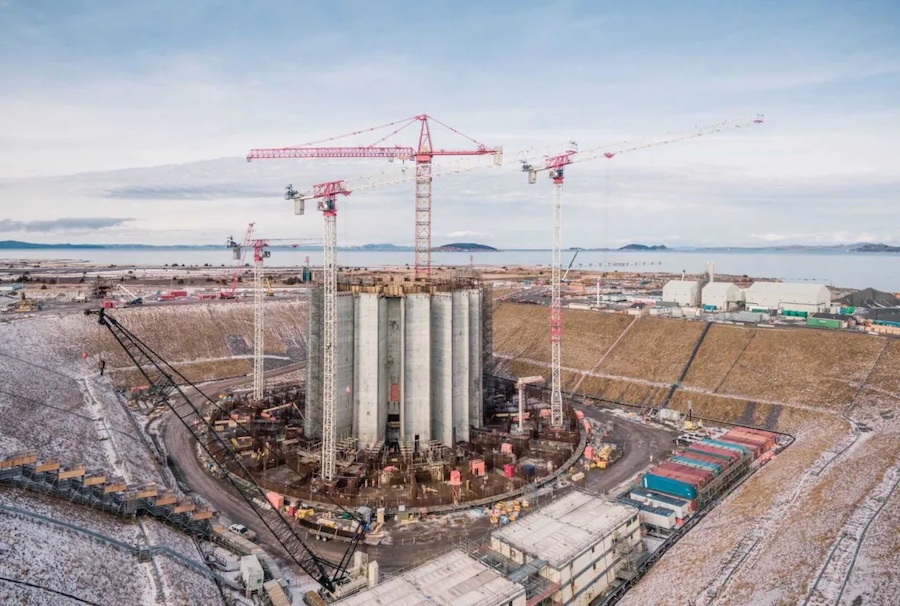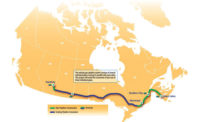Higher crude oil prices and rising European demand have spurred a restart of two previously shelved oil production projects in Newfoundland and Labrador.
Alberta-based Cenovus Energy Inc. and investment partner Suncor are resuming work on the West White Rose off-shore drilling platform, with estimated investment of up to $1.8 billion, while Norwegian oil and energy giant Equinor said it has won approval from federal officials in Canada for the estimated $9-billion, or more, Bay du Nord project, which will use a floating structure instead of a platform to produce, store and off-load oil.
Cenovus Energy now hopes to have its platform in place to begin pumping crude during the first half of 2026. The project was roughly 65% complete when halted by previous owner Husky Energy during the pandemic in 2020. That company was acquired by Cenovus Energy in 2021.
West White Rose is expected to hit peak production of about 80,000 barrels per day by the end of the decade, according to Cenovus Energy.
A consortium of SNC-Lavalin, Dragados and Pennecon was contracted to build the 145-m-high concrete gravity structure for the fixed drilling platform. Kiewit was awarded a contract for fabrication, construction and integration of topsides for the project.
TechnipFMC was awarded an engineering, procurement, construction and installation (EPCI) contract by Husky Energy in August 2017. The contract included the supply and installation of subsea equipment.
Cenovus Energy has reworked its project plans and refined its cost estimates, said Alex Pourbaix, president and CEO, in a statement.
Work on the platform, which will start next year, is expected to cost $1.2 billion to $1.4 billion, with another $389 million for subsea drilling and other work, the company said. It added that a revamped royalty agreement with the Newfoundland-Labrador gpvernment will provide “safeguards to the project’s economics in periods of low commodity prices.”
By comparison, scrapping the project and decommissioning the West White Rose project would cost almost as much as completing it—up to $1.4 billion over the next five years, according to the energy firm.
Darin King, executive director of Trades N.L., which represents 16 construction and building unions, said the project "is critical to the future of our province's building trades and construction industry."
The project will generate up to 1,500 more direct and indirect jobs during construction at a fabrication site at the port of Argentia, as well as on the platform, to be located about 350 km offshore, with about 250 new permanent platform jobs also to be created, said Andrew Parsons, Newfoundland-Labrador minister of industry, energy and technology.
"Employment at the Argentia site will ramp up immediately, and increase through next year," he said. "Over its 14-year life span, this project is expected to generate nearly $20 billion in gross domestic product, and over $7 billion in labor income for the province."
The deal with Cenovus Energy also includes $100 million to "support the energy transition and other renewable initiatives," said Parsons. "We will continue to foster an environment that supports our economy by embracing renewable energy, while maximizing our low-carbon oil and gas advantage."
Project Faces Hurdles
By contrast, Equinor’s Bay du Nord project still faces serious hurdles, with the challenge of nailing down a financing package amid a lawsuit by environmental groups.
Ecojustice, an environmental law nonprofit, last month filed a lawsuit in federal court on behalf of the Sierra Club Canada and Équiterre in a bid to block the massive oil production project.
Canadian Environment and Climate Minister Steven Guilbeault approved the project in May while attaching 137 conditions, including a requirement to meet net-zero carbon emission standards by 2050.
James Gunvaldsen Klaassen, a staff lawyer for Ecojustice, contends the federal approval of Bay du Nord did not take into account the impacts of the big fossil fuel extraction project, including possible harm to marine life of oil spills and large tanker traffic. “These are large tankers that are hauling production from the Bay du Nord to the island of Newfoundland or beyond,” he said.
But in a sign of growing market interest in east coast offshore oil projects, British oil giant BP on June 13 announced it was buying Cenovus Energy's 35% stake in Bay du Nord, with Equinor remaining as lead investor. Both firms have said their investments in offshore eastern Canada represents a shift away from oil sands production.
Subject to regulatory approvals, the BP transaction is expected to close in 2022. Equinor has estimated it will make a final investment decision in Bay du Nord in two years. The project would be located in the Flemish Pass Basin, 500 km northeast of St. John's, Newfoundland, in water that is about 1,200 m deep.




